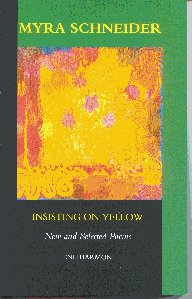
A longer poem is a response to talk by Esther Brunstein, a concentration camp survivor:
I try to write down
your story but words
can't re-create your presence,
voice, the weight of each bead
of suffering or the
sense of touch
in the library hall as if skin was laid
to skin, a communion.
Enitharmon Press
Price £8.95
Available from bookshops
...in
the country
ruled by don't, must, ought,
I joined the band of children
whose voices shrank, hid away.
Years on it was hard
to feel adult,
believe I could prise open
the box that holds weep and rage,
slide its catch to ask and argue,
laugh, persuade.
Throat, stay wide,
release my stream of sounds. (from
'Throat')
I often write about self-discovery and relationships. When I write
about other people I find I want to present them in context and not just
from my viewpoint. This is the end of a poem I wrote about my father after
he died:
In those four speechless
days
I began to strip him of shortcomings,
bury the terrible damages
and I hung onto his zest,
his generosities, his ever-
enquiring scientific mind,
his hunger for consciousness,
that miracle each person carries,
a delicate globe lit
by intricate, unseen filaments
which is so suddenly put out,
which is totally
irreplaceable.
'man', 'woman', 'eat', 'walk',
signed them with my fingers.
Week after week he squeezed
the shapes into air, slotted
the finicky sets of letters
into place, crawled them over a page.
At last they hooked to his memory.
Exulting, he flung each out,
an exotic kite to fly in the blue dazzle.
see the wild lilies
in their hundreds on the valley floor:
a fanfare of cool creamy bells,
their clappers, orange dots
that subdue long grasses and leafery.
Quiet unfolds its cloth.
These are the lilies of the field,
an array that surpasses Solomon's glory.
In the brightness
I suddenly see Stanley Spencer's Christ,
a fat simple man, loose shirt billowing,
gentle face transfigured by wonder
as on hands, knees
he contemplates small daisies.